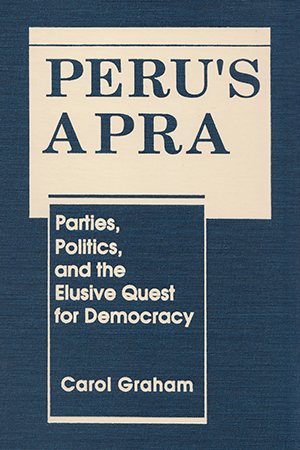When Peru's APRA—one of the oldest and most controversial political parties in Latin America—came to power in 1985, expectations were high for the new government, in part because a decade of economic decline and social crisis had discredited both the military and the right as alternatives. APRA did manage to maintain an unprecedented consensus for two years. But a sudden shift in strategy to confrontational rhetoric and authoritarian tactics led to policy stagnation, economic collapse, and a surge of reaction and political violence from extremes of the left and right. Rather than playing the role of the strong center, APRA acted as a catalyst to the polarization process. The party's sectarian and authoritarian strains, coupled with the increasingly erratic behavior of its once-popular young leader, Alan Garcia, created damaging and perhaps irreparable cleavages between the party and the rest of society, and between society and polity in general.
This book examines the evolution of APRA from its origins in the 1920s through its tenure in government, ending with the 1990 elections. Graham explores the consensus that the party built and the reasons for its breakdown, looking at party-government relations, the party's role in economic policymaking, its relations with the opposition, and finally, its relations with the marginalized sectors of society, in particular the urban poor. Beyond explaining the extreme crisis in Peru, she contributes to an understanding of the role of parties in the difficult process of democratic consolidation in developing countries.
Carol Graham is guest scholar in the Brookings Institution's Foreign Policy Studies Program and adjunct professor of government at Georgetown University.
"Graham's meticulous study of the APRA in power, covering all the nuances of party intrique, political infighting and uncompromising and clashing egos will not be replaced for some time to come."—Journal of Third World Studies
"Graham brilliantly demonstrates that the failure of APRA ... to advance its reformist agenda arose out of its sectarian, often contradictory, and highly personalized nature.... Beyond Graham's excellent analysis of APRA in power, Peru's APRA is informed by a solid understanding of the disintegrating Aprista local culture, which had become patrimonial and increasingly outdated."—Latin American Research Review
"[A] thorough and judicious analysis of the García administration ...." —Studies in Comparative International Development
"Graham brilliantly demonstrates that the failure of APRA to advance its reformist agenda arose out of its sectarian, often contradictory, and highly personalized nature.... Beyond explaining the extreme crisis in Peru, Graham contributes to an understanding of the role of parties in the difficult process of democratic consolidation in developing countries."—Latin America Resource Review
"To understand the disillusionment of both Peru's elites and popular sectors with the country's constitutional democracy, Carol Graham's book is invaluable. . . . Graham's study greatly enhances our understanding of the failure of the 1985-1990 APRA government." —American Political Science Review
"Detailed and frequently fascinating account and analysis of the Garcia Administration."—Revista Interamericana de Bibliografia
"A very good book. . . . extremely well-researched, lucidly written and sensitively judged; this combination is rare indeed."—International Affairs
"This well-researched, well-documented account of the APRA party in contemporary Peru also contains excellent analysis of the Aprista leadership." —Choice






